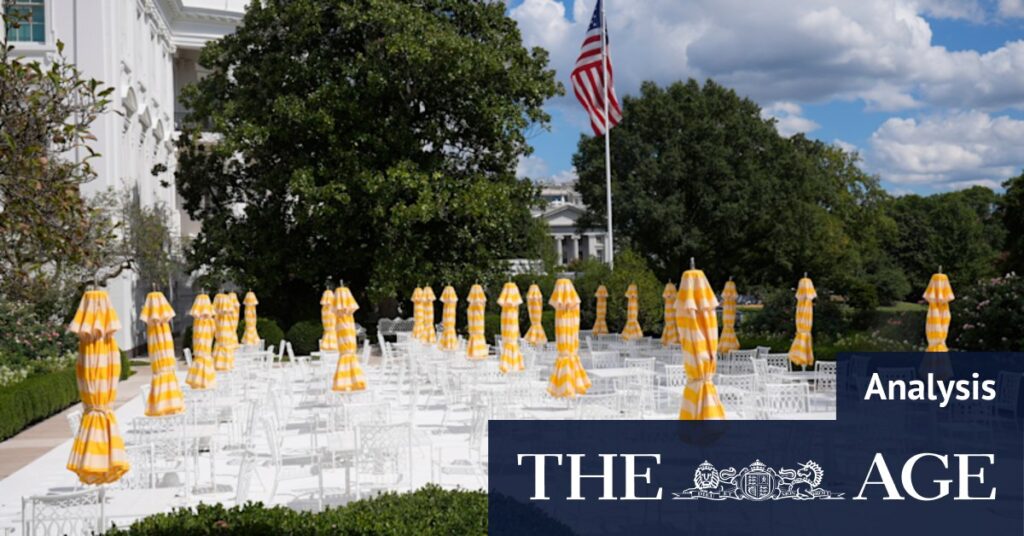
The White House Rose Garden, a historic and iconic outdoor space, has been renamed “The Rose Garden Club” by President Donald Trump. Originally conceived by First Lady Edith Roosevelt in 1903 and named by Ellen Wilson, the wife of President Woodrow Wilson, the garden has been a site for numerous presidential events. Under Trump’s administration, it has undergone significant changes, reflecting his penchant for rebranding and redesigning.
This development follows a summer renovation where the garden’s grass was replaced with stone, and new outdoor tables and seating were installed, giving it a look reminiscent of Trump’s Mar-a-Lago estate. The garden was set to host a dinner for tech leaders on Thursday night, but inclement weather forced the event indoors to the State Dining Room.
The Transformation of an Iconic Space
The Rose Garden has long been a symbol of American history and politics, hosting bill-signing ceremonies, press conferences, and formal dinners. It was redesigned for ceremonies under Jackie Kennedy in the 1960s, maintaining a green and lush appearance. However, Trump’s version is more akin to a private club, complete with branding paraphernalia spotted at the White House.
White House spokesman Davis Ingle described the revamped garden as “the hottest place to be in Washington, or perhaps the world,” emphasizing the president’s enthusiasm for hosting future events in the “new, beautiful Rose Garden patio.”
Trump’s Vision for the White House
Trump’s changes to the Rose Garden are part of a broader effort to reshape the White House to his liking. This includes redecorating the Oval Office with gold furnishings and planning a new ballroom off the East Wing. These modifications reflect Trump’s style, often characterized by opulence and grandeur.
The president’s approach to the White House is not without precedent; previous administrations have also left their mark on the residence. However, Trump’s changes are notable for their scale and the speed at which they have been implemented.
Tech Leaders Gather at the White House
Despite the weather-induced change of venue, Thursday night’s dinner was attended by several tech industry titans, including Meta CEO Mark Zuckerberg, Microsoft co-founder Bill Gates, Apple CEO Tim Cook, and OpenAI’s Sam Altman. The gathering underscored Trump’s interest in engaging with business leaders, particularly in the tech sector.
During a brief Q&A session with journalists, Trump addressed various topics, including the upcoming employment figures and the appearance of his health secretary Robert F. Kennedy Jr before a congressional committee. Trump praised Kennedy for his “different” ideas, particularly regarding health and vaccines.
Implications and Future Prospects
The renaming and redesign of the Rose Garden reflect Trump’s broader strategy of imprinting his brand on the presidency. The “Rose Garden Club” is a fitting addition to Trump’s portfolio of branded properties, aligning with his identity as a businessman and club owner.
As the garden awaits its post-renovation debut, the White House continues to be a focal point for political and cultural change. The transformation of such a historic space raises questions about the balance between tradition and modernization in presidential legacies.
With another event scheduled for Friday evening, the Rose Garden Club is poised to become a central venue for future White House gatherings. As Trump’s presidency progresses, it remains to be seen how these changes will be perceived by the public and historians alike.







